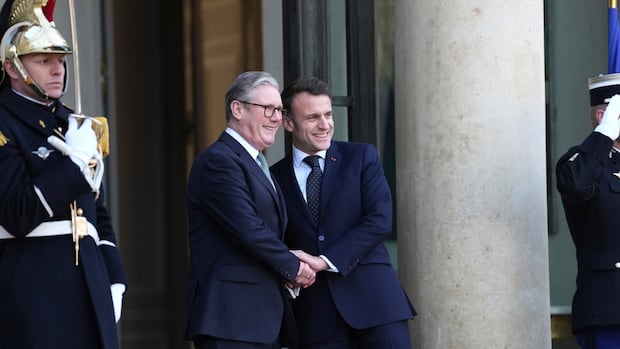French President Emmanuel Macron, who has long championed a stronger European defence, said their stinging rebukes and threats of non-co-operation in the face of military danger felt like a shock to the system.
The tipping point came when Trump decided to upend years of U.S. policy by holding talks with Russian President Vladimir Putin in hopes of ending the Russia-Ukraine war.
Shortly before the meeting in Paris on Monday, Macron spoke with Trump, but Macron’s office would not disclose details about the 20-minute discussion.
U.S. and Russia to hold high-level talks
Lavrov and Putin’s foreign affairs adviser, Yuri Ushakov, set off for the Saudi capital, Riyadh, on Monday, according to Russian state TV. U.S. Secretary of State Marco Rubio, national security adviser Mike Waltz and Special Envoy Steve Witkoff will meet the Russian delegation, State Department spokesperson Tammy Bruce said. Ukraine will not participate.
Kremlin spokesperson Dmitry Peskov said the talks will be primarily focused on “restoring the entire range of U.S.-Russian relations, as well as preparing possible talks on the Ukrainian settlement and organizing a meeting of the two presidents.”
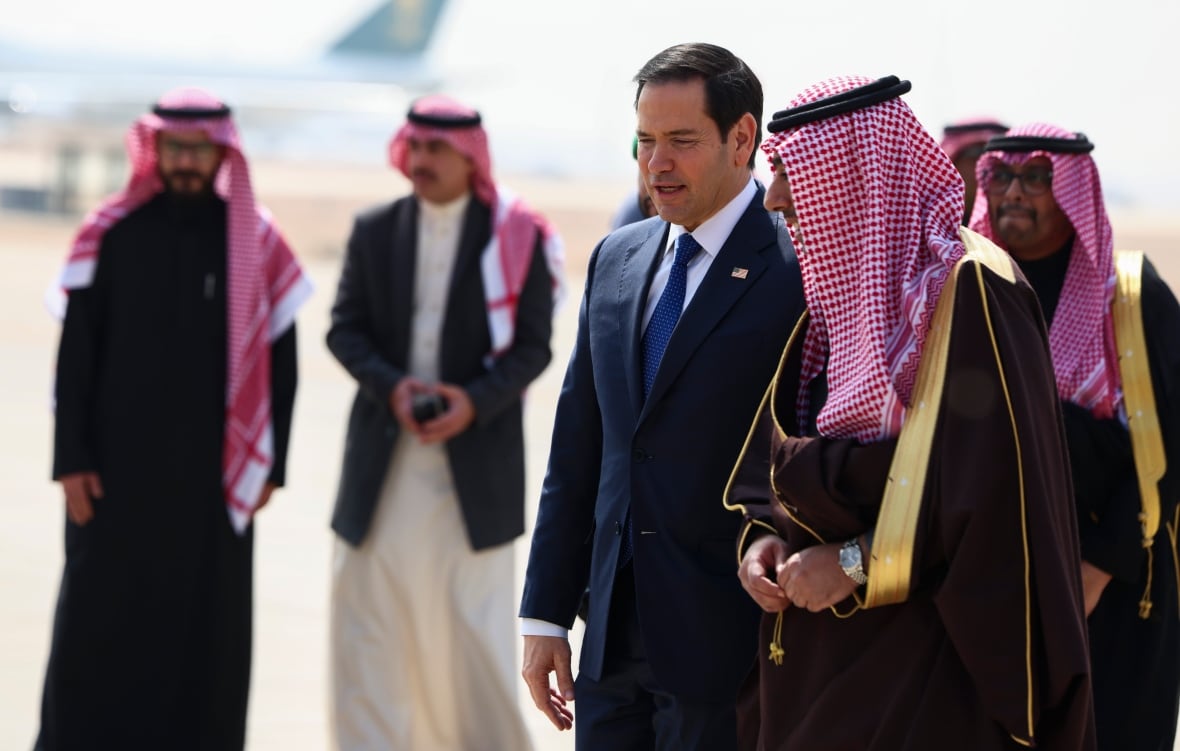 Rubio, foreground left, arrives at King Khalid International Airport in Riyadh, Saudi Arabia, on Monday. This would be the most significant meeting between the sides since Moscow’s full-scale invasion of Ukraine nearly three years ago. (Evelyn Hockstein/Pool Photo/The Associated Press)
Rubio, foreground left, arrives at King Khalid International Airport in Riyadh, Saudi Arabia, on Monday. This would be the most significant meeting between the sides since Moscow’s full-scale invasion of Ukraine nearly three years ago. (Evelyn Hockstein/Pool Photo/The Associated Press)
Bruce said the meeting is aimed at determining how serious the Russians are about wanting peace and whether detailed negotiations can be started.
“I think the goal, obviously, for everyone is to determine if this is something that can move forward,” she told reporters travelling with Rubio in Riyadh.
Bruce said that even though Ukraine would not be at the table for Tuesday’s talks, actual peace negotiations would only take place with Ukraine’s involvement. Kyiv’s participation in any peace talks was a bedrock of U.S. policy under Trump’s predecessor, Joe Biden.
Hegseth, the U.S. defence secretary, said last week that NATO membership for Ukraine was unrealistic and suggested Kyiv should abandon hopes of winning all of its territory back from Russia — two key items on Putin’s wish list.
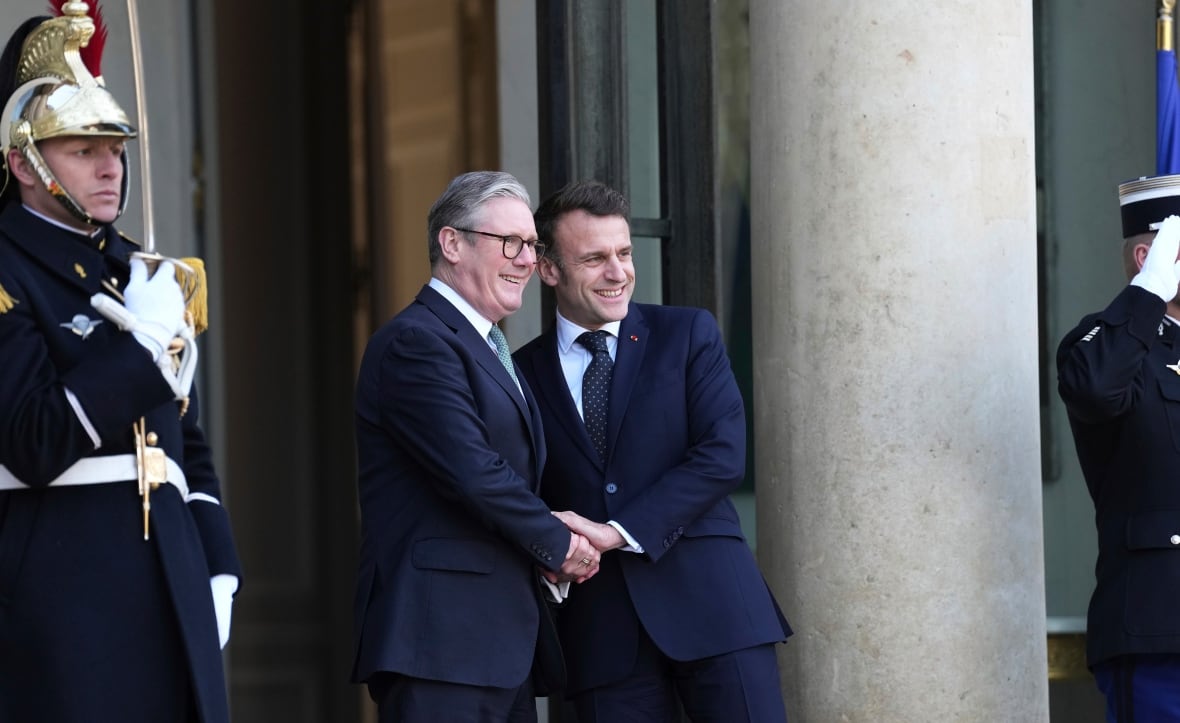 French President Emmanuel Macron, right, greets British Prime Minister Keir Starmer as he arrives for an informal meeting of leaders from key European Union nations and the United Kingdom at the Elysee Palace in Paris on Monday. (Aurelien Morissard/The Associated Press)Ukraine won’t accept outcome if Kyiv doesn’t take part
French President Emmanuel Macron, right, greets British Prime Minister Keir Starmer as he arrives for an informal meeting of leaders from key European Union nations and the United Kingdom at the Elysee Palace in Paris on Monday. (Aurelien Morissard/The Associated Press)Ukraine won’t accept outcome if Kyiv doesn’t take part
The talks would mark a significant expansion of U.S.-Russian contacts, nearly three years into a war that has seen ties fall to the lowest level in decades.
Tuesday’s talks follow a telephone call between Trump and Putin in which the American president said they “agreed to have our respective teams start negotiations immediately.” The call upended years of U.S. policy, ending the isolation of Moscow over its Feb. 24, 2022, invasion of Ukraine.
WATCH | Trump, Putin discuss ending Ukraine war in ‘highly productive’ call last week: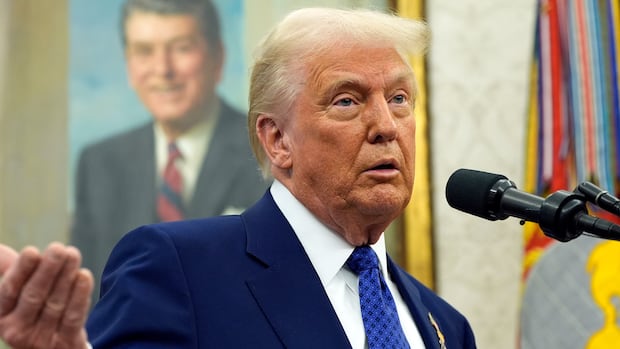
Trump, Putin discuss ending Ukraine war in ‘highly productive’ call
U.S. President Donald Trump and Russian President Vladimir Putin agreed to visit each other’s countries and begin talks to end the war in Ukraine in what Trump called a ‘highly productive’ call. Still unclear is whether Ukraine’s president Volodymyr Zelenskyy will even have a role in peace talks.
After the call, Trump phoned Zelenskyy to inform him about their conversation. Trump on Sunday told reporters that Zelenskyy “will be involved” but did not elaborate.
The Ukrainian president said Monday his country had not been invited to the upcoming talks and won’t accept the outcome if Kyiv doesn’t take part.
The U.S.-Russia talks would “yield no results,” given the absence of any Ukrainian officials, Zelenskyy said on a conference call with journalists from the United Arab Emirates.
Ukraine’s president said he would travel to Turkey on Monday and to Saudi Arabia on Wednesday, but that his trip to the Arab nation was unrelated to the U.S.-Russia talks.
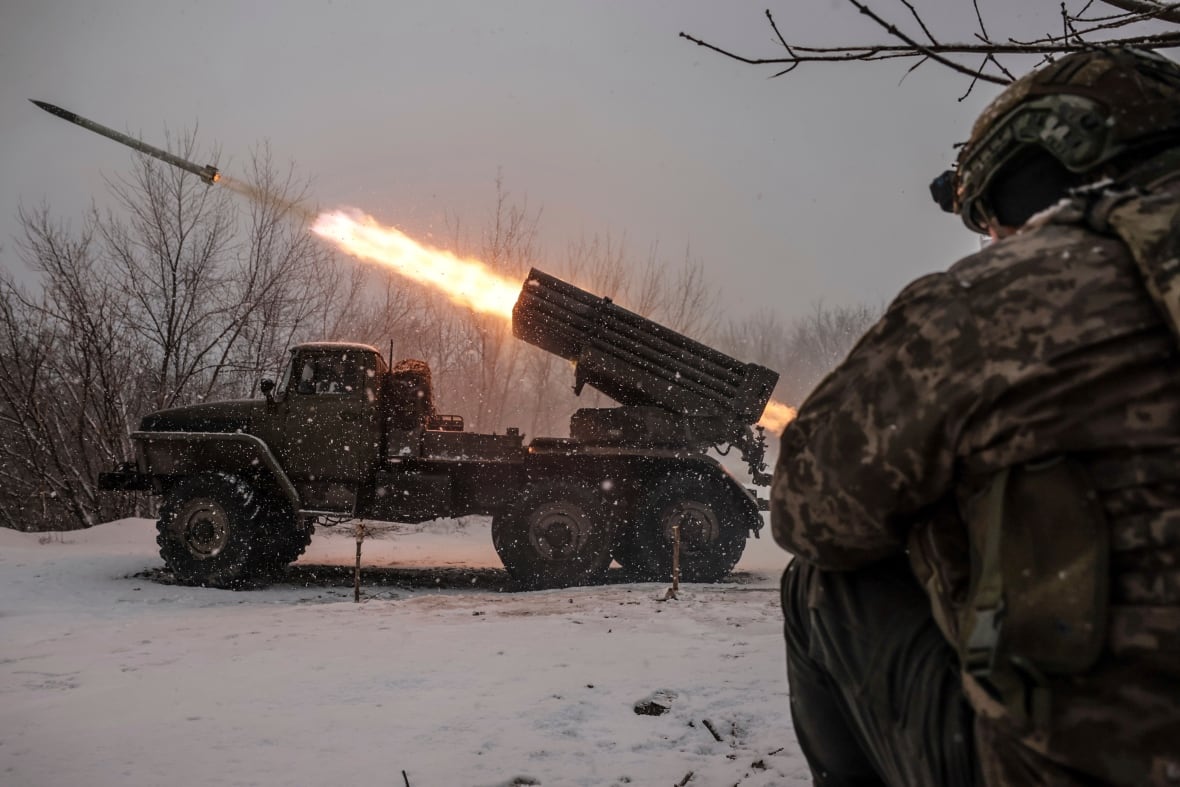 The talks, scheduled for Tuesday in Saudi Arabia, mark another pivotal step by the Trump administration to reverse U.S. policy on isolating Russia, and are meant to pave the way for a meeting between U.S. President Donald Trump and Russian President Vladimir Putin. (Oleg Petrasiuk/Ukraine’s 24th Mechanised Brigade/The Associated Press)Europeans stand by their support for Ukraine
The talks, scheduled for Tuesday in Saudi Arabia, mark another pivotal step by the Trump administration to reverse U.S. policy on isolating Russia, and are meant to pave the way for a meeting between U.S. President Donald Trump and Russian President Vladimir Putin. (Oleg Petrasiuk/Ukraine’s 24th Mechanised Brigade/The Associated Press)Europeans stand by their support for Ukraine
Britain’s Starmer, who said he will travel to Washington next week to discuss with Trump “what we see as the key elements of a lasting peace,” appears to be charting a “third way” in Europe’s shifting geopolitical landscape — aligning strategically with the U.S. administration while maintaining EU ties.
Some analysts suggest this positioning could allow him to act as a bridge between Trump and Europe, potentially serving as a key messenger to the White House.
German Chancellor Olaf Scholz told reporters that a possible peace agreement with Russia cannot be forced on Ukraine from outside. “For us, it must and is clear: This does not mean that peace can be dictated and that Ukraine must accept what is presented to it,” he insisted.
Spanish Prime Minister Pedro Sánchez said that any peace agreement would need to have the active involvement of the EU and Ukraine, so as to not be a false end to the war “as has happened in the past.”
He added: “What cannot be is that the aggressor is rewarded.”
A strong U.S. component, though, will remain essential for the foreseeable future since it will take many years before European nations can ratchet up defence production and integrate it into an effective force.
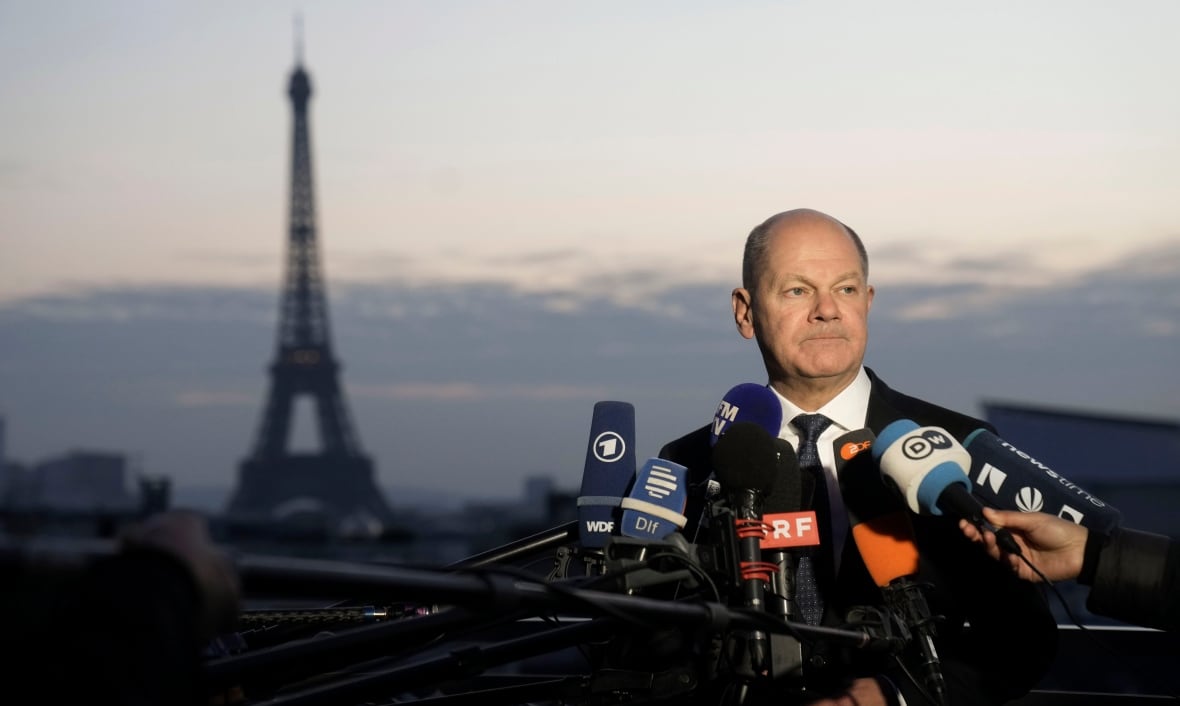 German Chancellor Olaf Scholz speaks with the media at the German Embassy after the informal meeting of leaders from key EU nations and the U.K., in Paris on Monday. (Thibault Camus/The Associated Press)
German Chancellor Olaf Scholz speaks with the media at the German Embassy after the informal meeting of leaders from key EU nations and the U.K., in Paris on Monday. (Thibault Camus/The Associated Press)
That U.S. bond also applies to dealing with war in Ukraine, Starmer said.
“U.S. support will remain critical, and a U.S. security guarantee is essential for a lasting peace, because only the U.S. can deter Putin from attacking again,” he wrote in Monday’s Daily Telegraph.
Sending troops after a peace deal?
While many EU nations are still mulling whether to contribute troops to a potential force in Ukraine after a peace deal, Starmer said that Britain was “ready and willing to contribute to security guarantees to Ukraine by putting our own troops on the ground if necessary.
Macron last year refused to rule out sending Western troops into Ukraine if necessary.
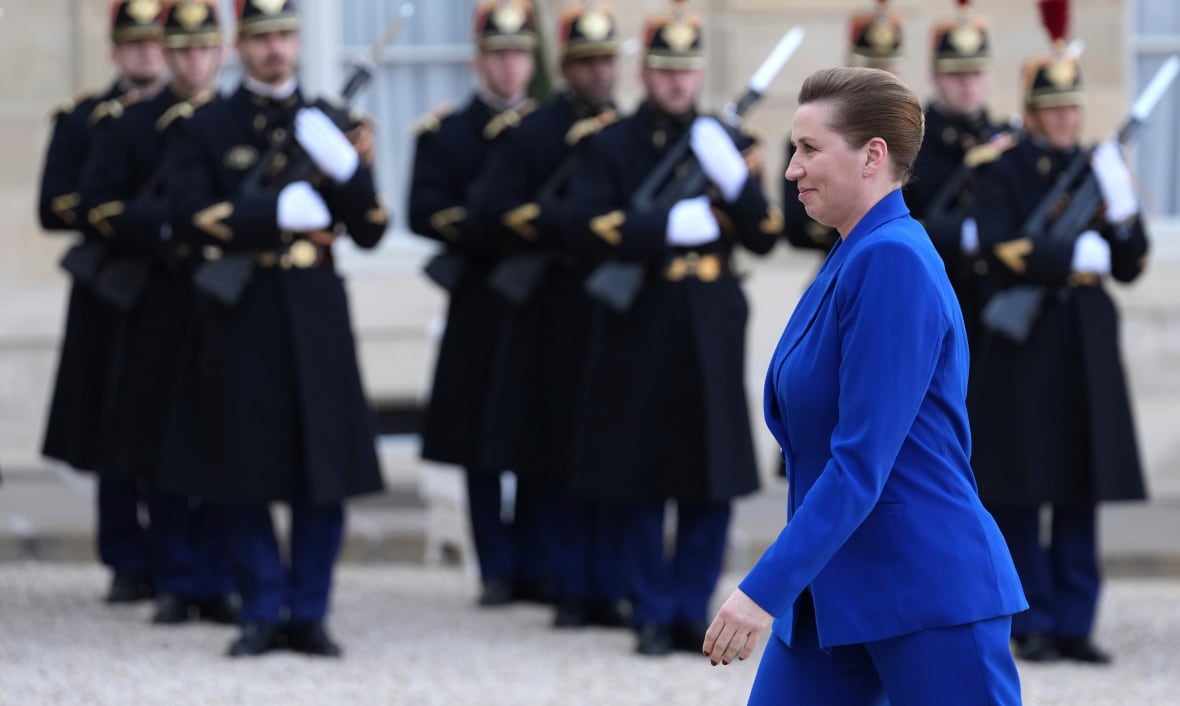 Danish Prime Minister Mette Frederiksen arrives for a meeting of leaders from key EU countries and the U.K. at the Élysée Palace in Paris on Monday. (Aurelien Morissard/The Associated Press)
Danish Prime Minister Mette Frederiksen arrives for a meeting of leaders from key EU countries and the U.K. at the Élysée Palace in Paris on Monday. (Aurelien Morissard/The Associated Press)
“The time has come for a much greater ability of Europe to defend itself,” Polish Prime Minister Donald Tusk said. “There is unanimity here on the issue of increasing spending on defence. This is an absolute necessity.” Poland spends more than four per cent of its GDP on defence, more than any other NATO member.
Yet Scholz said it was too soon to talk about boots on the ground.
“It is completely premature and completely the wrong time to have this discussion now. I’m even a little irritated by these debates,” the German chancellor said. Peace talks “have not taken place and … Ukraine has not said yes and has not sat at the table.
“This is highly inappropriate, to put it bluntly and honestly: We don’t even know what the outcome will be,” Scholz said.
Source link : http://www.bing.com/news/apiclick.aspx?ref=FexRss&aid=&tid=67b56a05035d4e3b89be8bcb74426708&url=https%3A%2F%2Fwww.cbc.ca%2Fnews%2Fworld%2Frussia-ukraine-america-war-talks-1.7461046&c=16214484181826241540&mkt=en-us
Author :
Publish date : 2025-02-17 18:32:00
Copyright for syndicated content belongs to the linked Source.

